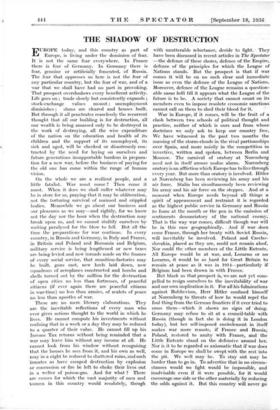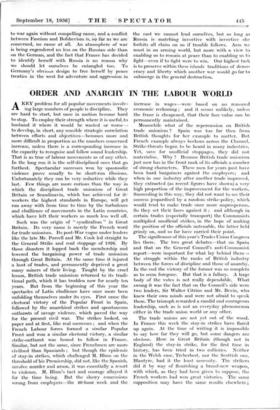THE SHADOW OF DESTRUCTION E UROPE today, and this country as
part of Europe, is living under the dominion of fear. It is not the same fear everywhere. In France there is fear of Germany. In Germany there is fear, genuine or artificially fomented, of Russia.
The fear that oppresses us here is not the fear of any particular country, but the fear of war, and of a war that we shall have had no part in provoking. That prospect overshadows every beneficent activity. Life goes on ; trade slowly but consistently expands ; stock-exchange values mount ; unemployment diminishes ; slums are cleared and houses built. But through it all penetrates ceaselessly the recurrent thought that all our building is for destruction, all our wealth is being amassed only to be destroyed in the work of destroying, all the wise expenditure of the nation on the education and health of its children and the support of its unemployed, its sick and aged, will be checked or disastrously eon- tracted by the need for laying on ourselves and future generations insupportable burdens in prepara- tion for a new war, before the business of paying for the old one has come within the range of human vision.
On the whole we are a resilient people, and a little fatalist. War must come ? Then come it must. When it does we shall suffer whatever may be in store for us, praying that it may be obliteration, not the torturing survival of maimed and crippled bodies. Meanwhile we go about our business and our pleasures as we may—and rightly, for we know not the day nor the hour when the destruction may break upon us, and we cannot stultify ourselves by waiting paralysed for the blow to fall. But all the time the preparations for war continue. In every country, in Russia and Germany, in Italy and France, in Britain and Poland and Rumania and Belgium, military service is being lengthened or new taxes are being levied and new inroads made on the finance of every social service, that munition-factories may be built, guns cast, new keels laid down, new squadrons of aeroplanes constructed and bombs and shells turned out by the million for the destruction of open cities no less than fortresses, of peaceful citizens (if ever again there are peaceful citizens in war-time) no less than armies, of zealots of peace no less than apostles of war.
These are no mere literary elaborations. They are the inevitable reflections of every man who ever gives serious thought to the world in which he lives. He cannot compute his investments without realising that in a week or a day they may be reduced to a quarter of their value. He cannot fill up his Income Tax returns without being reminded that a war may leave him without any income at all. He cannot look from his window without recognising that the houses he sees from it, and his own as well, may in a night be reduced to shattered ruins, and such inmates as have escaped destruction by explosion or concussion or fire be left to choke their lives out in a welter of poison-gas. And for what ? There are causes for which the vast majority of men and women in this country would resolutely, though with unutterable reluctance, decide to fight. - They have been discussed in recent articles in The Spectator the defence of these shores, defence of the Empire; defence of the principles for which the League of Nations stands. But the prospect is that if war comes it will be on no such clear • and immediate issue as even the defence of the League of Nations.
Moreover, defence of the League remains a question- able cases belli till it appears what the -League of the future is to be. A society that cannot count on its members even to impose resolute economic sanctions cannot call on them to shed their blood for it.
War in Europe, if it comes, will be the fruit of a clash between two schools of political thought and practice, neither of which is ours and from whose doctrines we only ask to keep our country free. We have witnessed in the past two months. the massing of the storm-clouds in the rival partisanships over Spain, and more noisily in the competition in invective, written and spoken, between Berlin and Moscow. The carnival of oratory at Nuremberg need not in itself arouse undue alarm. Nuremberg oratory is an affliction which Europe has to live through every year. But more than oratory is involved. Hitler at Nuremberg has been reviewing his army and his air force. Stalin has simultaneously been reviewing his army and his air force on the steppes. • And at a moment when Europe needs beyond all things a spirit of appeasement and restraint it is regarded as the highest public service in Germany and Russia to foam at the mouth or the pen in the -emission of sentiments denunciatory of the national enemy: That is the way war comes, difficult though -war will be in this case geographically.. And if war doe& come France, through her treaty with Soviet Russia, will inevitably be involved. Poland and Czecho-. slovakia, placed as they are, could not remain aloof. Nor could the other members of the Little Entente: All Europe would be at war, and, Locarno or no Locarno, it would be as hard for Great Britain to remain at peace as it was in 1914—particularly if Belgium had been drawn in with France. But black as that prospect is, we are not yet com- pelled to resign ourselves to the inevitability - of war and our own implication in it. For all his fulminations against Bolshevism, Herr Hitler confined himself at Nuremberg to threats of how he would repel the foul thing from the German frontiers if it ever tried to cross them—which it shows no signs of doing. Germany may refuse to sit at a cowacil-table. with Russia (though in fact she is doing- it in London today), - but her self-imposed encirclement in itself makes war more remote; if France and Russia; Poland, restored to amity -*nth France, and the Little Entente stand on the defensive around her. Nor is it to be regarded as axiomatic that if war does come -in Europe we shall be swept with the rest into the pit. We well may be. To stay out may be harder than to go in. To advertise that in no circum- stances would we fight would be impossible, and inadvisable even if it were possible, for it would encourage one-side or the other materially by reducing the odds against it. But this country will never go to war again without compelling cause, and a conflict between Fascism and Bolshevism is, *;*far Its -*e are concerned, no cause at all. An atmosphere of war is being engendered no less on the Russian side than on the German; and the fact that France has decided to identify herself -with Russia is no reason why we should let ourselves be entangled too. ; To Germany's obvious design to free herself by peace treaties -in the west for adventure and aggression in the east we cannot lend ourselires, but so long as Russia is-- matching invective with invective she forfeits all claim on us if trouble follows. Arm we must in an arming world, but more with a view to enabling us to remain at peace than to enabling us to fight—even if to fight were to win. Our highest task is to preserve within these islands traditions of demo- cracy and liberty which another war would go far to submerge in the general destruction.











































 Previous page
Previous page